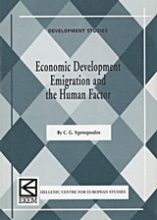Economic Development, Emigration and the Human Factor
This monograph was first published in 1983, when in Greece migration was practically associated with the sending of masses of people abroad. Between then and now, there have been some noticeable socio-economic changes in the country. In the first place, there has been a continuation of the period of political stability, which started with the return to parliamentary rule in 1974. Secondly, during the same time the economy has demonstrated reasonable rates of growth, which have produced a cautious optimism that better days are still to come. As a result the country has moved from the north of the South to the south of the North. It is no longer classified as a developing country in any remote sense. It recently joined the European Monetary Union on merit. In as much as population movements are concerned, Greece is one of the very few countries in Europe, which, within the space of 20 to 30 years, has become mainly a country of receiving immigrants. In its second edition this monograph has been significantly enriched from the point of view of bibliography. Very few new ideas have been put forward, but mainly a number of arguments have been strengthened. However, the work's analytical framework remains the same. The study of the present greek migratory situation - which encompasses emigrants, returnees, immigrants and refugees - requires a totally different approach and as such it lies outside the scope of the present effort. The merits, if any, of this work lie, we hope, in its internal consistency and its usefulness as a point of reference for those countries that still supply emigrants.[...] (από τον πρόλογο του συγγραφέα)
- ISBN978-960-02-1450-5
- Ημ/νια Έκδοσης2000
- Σελίδες75
- ΔέσιμοΜαλακό εξώφυλλο
- Διαθέσιμες Γλώσσες
- Θεματολογίες Βιβλίου
- Συγγραφέας
- Εκδότης

